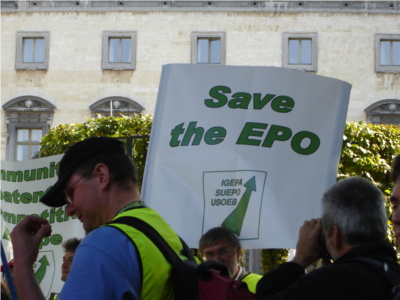It is no secret that Battistelli resents the boards which he's increasingly afraid of

Summary: A critical evaluation of what goes on at the European Patent Office (EPO), which is quickly descending down (and overall degrading) to the level of Chinese systems, along with the corruption, the abuses, and the low quality of patents
THE EPO (speaking collectively of the management, not examiners) is a liar and a propagandist. It uses 'creative' statistics to make it seem as though things are all rosy [1, 2, 3] and Web sites which prefer to believe anything that EPO marketers claim still repeat the talking points, albeit there's one element to it that can be counted more objectively, e.g.:
The number of inter partes oppositions decided increased by 17.6% to 3,713. In 31% of the decisions in opposition, the patent was maintained as granted. The percentage of patents revoked in opposition was also 31%. In the remaining 38% of the cases, the patent was maintained in amended form. The proportion of patents opposed was 4.4%.
The performance of the Boards of Appeal shows a steady state as regards the number of technical appeal cases decided. Some 2,387 technical appeals were received, of which 1,523 were opposition appeals and the remaining 864 were examination appeals.
What this generally tells us, in simpler terms, is that more than a thousand EPO patents were ruled invalid by the Boards of Appeal upon closer scrutiny. That's a lot and
some of these applications (not granted) which the board looks at are software patents in disguise (the
G3/08 referral dealt with software patents more than half a decade ago). There can be
billions of dollars at stake (bogus patents) and
those who typically benefit from it exploit pressure and urgency against examiners. The EPO needs more of these boards and less of those maximalists who flaunt bogus figures, wrongly insinuating that more patents is more "production" (as if the goal is to just grant more and more patents irrespective of their merit).
This
very recent analysis from a patent lawyers' firm looked at IP5 Offices (the big patent offices) and stated: "The biggest difference in claims format between the IP5 offices is in the requirement for “one-part” versus “two-part” claims. The State Intellectual Property Office of the People's Republic of China (SIPO) is the only office that mandates “two-part” claims, while the European Patent Office (EPO) prefers a “two-part” claim form. A claim is considered to be in “two-part” form if it lists some elements, then contains the phrase “characterized in that” or “characterized by,” and then lists one or more further elements. The latter elements (or the “characterizing portion”) are considered to be the novel or inventive features of the claimed invention, while the former elements are deemed to be found in the prior art. A “one-part” claim, on the other hand, does not identify any features as belonging to the state of the art. “Two-part” claims are not required or encouraged by the other three IP5 offices. The EPO also encourages reference signs placed within parentheses in the claims. The reference signs relate to technical features identified in the drawings of the patent application. Under European Patent Convention (EPC) Rule 29(7), the reference signs are only used for increasing the intelligibility of the claims and are not construed as limiting the claims."
What we find amusing here is the similarity between the EPO and SIPO, which Battistelli evidently loves and emulates so much (including, apparently, human rights aspects of China). Just watch all those recent announcements and raves from Battistelli about SIPO (not the Croatian one from which Battistelli got his aggressive attack dog, Željko Topić). SIPO's patent quality (and language barriers) is probably a lot worse than even the USPTO, where
patent quality became a farce quite some time ago.
Battistelli is gradually killing the EPO by harming its reputation and lowering the quality of patents (which used to justify the very high prices of patents and renewals). Battistelli, an ENA graduate, is seemingly convinced that a race to the bottom is what will help the Office. How wrong is he. Battistelli, moreover, keeps lobbying for the UPC (
even earlier this month), which would possibly make all or some of the boards redundant. It guarantees a decline in patent quality.
UPC boosters like
MIP continue to pretend that the UPC is almost here (
forget it, this might die pretty soon, just like previous incarnations) and
a UPC monetisation firm now says that Lithuania is prepared to shoot itself in the foot with this UPC ploy. Have EU corporatists
threatened nations with sanctions again (unless they adopt the UPC)? To quote the UPC monetisation firm:
The Lithuanian government has submitted draft legislation to the Seimas (the unicameral parliament) to enable Lithuania to ratify the UPC Agreement and to form, with Sweden, Estonia and Latvia, a regional division of the UPC. The draft legislation, submitted on 9 March 2016, includes: Bill to ratify the UPC Agreement, Bill to ratify the Agreement on the establishment of a Nordic-Baltic regional division of the UPC, and Bill to amend the Patent Law. The bills currently show a date of entry into force of 1 July 2017.
What Europe needs more of is independent boards. Those are the boards which, just like US patent courts, are able to objectively assess patents without the incentive to grant (unlike patent offices). The UPC goes against all that by potentially abolishing the boards and increasing costs (litigation rather than
appeal at a board level with European-wide implications for 'damage' calculations and injunctions).
Battistelli is still out of his mind and he needs to be stopped.
⬆
